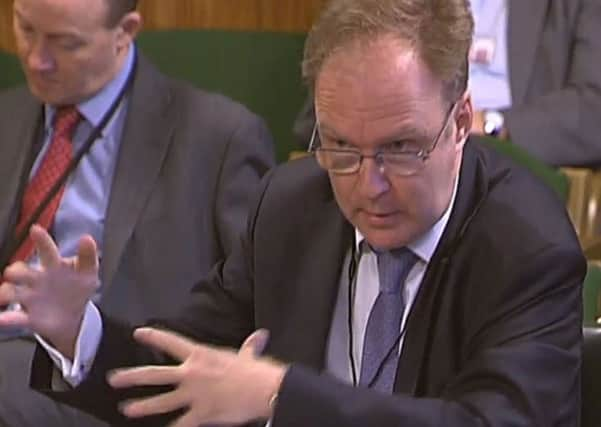Brexit talks will get ugly, former ambassador to EU warns


Sir Ivan Rogers, who quit in January after telling Prime Minister Theresa May that Brussels diplomats thought it might take 10 years to reach a deal, said there was a “humongous” amount of work to do in what would probably be the country’s largest ever negotiation.
Sir Ivan told the House of Commons European Scrutiny Committee that he did not leak his advice to Mrs May, which sensationally became public ahead of a key European Council summit in December.
Advertisement
Hide AdAdvertisement
Hide Ad“I never leak, I never have, I never would,” said the diplomat. “I can categorically deny and rebut that.”
Sir Ivan denied that he had ever said that he personally believed a post-Brexit trade deal would take 10 years.
But he said his private memo to Mrs May detailed the “street wisdom among the senior players” in Brussels and EU capitals, who thought trade negotiations would not start until late 2017 at the earliest and would not be concluded and ratified until the “early-mid 2020s”.
Sir Ivan told the cross-party committee the separate talks on withdrawal from the EU and Britain’s future trading relationship with its former partners would be “an unprecedentedly large negotiation covering large tracts of Whitehall ... on a scale we haven’t experienced probably ever and certainly since the Second World War”.
He added: “This is going to be on a humongous scale. We are going to have enormous amounts of business running up various different channels and then involve difficult trade-offs for Her Majesty’s Government and difficult trade-offs for the other 27 on the other side of the table.
“Obviously, I would expect us and the 27 to be coming at this from very different angles and with very different objectives, but negotiations ultimately only culminate in deals if there is a determination on both sides of the table to make progress.
“That involves generating a momentum and generating an atmosphere so that even when we get into name-calling and an extremely feisty atmosphere - and we undoubtedly will in both exit negotiations and future trade and economic negotiations - there is still an atmosphere to proceed and finalise agreement.”
Sir Ivan said the UK and EU were currently in a “phoney war situation” and could be expected to make “pious” pronouncements at this stage about the need for agreement on free trade.
Advertisement
Hide AdAdvertisement
Hide AdBut he warned that talks “usually end up in a fairly mercantilist fist-fight” before finally resolving themselves in a deal of some sort.
Senior insiders in Brussels and other EU capitals universally believed the process of negotiating a free trade deal and getting it ratified by the European Parliament and national and regional assemblies across the continent would take until “the early-mid 2020s”, he said.
“I never used ‘10 years’,” he said. “What I did - which I think is what ambassadors are partly there for - is to report what I was getting from the most senior voices around Brussels.”
He added: “I have been saying to people it is possible to go much faster with the UK.”
Sir Ivan said he had “no doubt” that the UK will be able to negotiate trade deals with non-EU states more swiftly after withdrawal.
“One of the key cases for leaving is the nimbleness and agility we would have (when) not a member state, on our own, to negotiate at speed with only our own priorities on the table,” he told MPs.
“I have no doubt that we will negotiate FTAs (free trade agreements) with other partners outside the EU faster than the EU can do it. No doubt at all.
“The question is then the negotiating heft you have at the table in comparison with being part of a wider bloc. The advantage of being in the EU is not speed or nimbleness .... it is the size of the market. Why are the Canadians or South Koreans or others interested in the EU market? It’s the size and scale.”
Advertisement
Hide AdAdvertisement
Hide AdSir Ivan predicted that details from the negotiations are likely to be copiously leaked during the two-year process of withdrawal under Article 50 of the EU treaties.